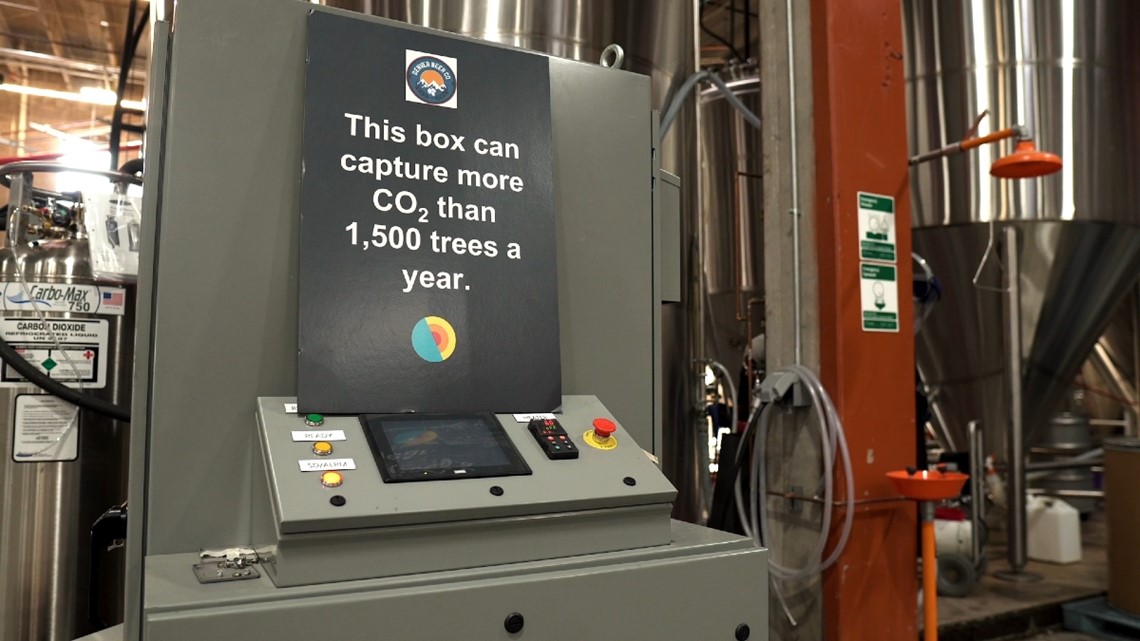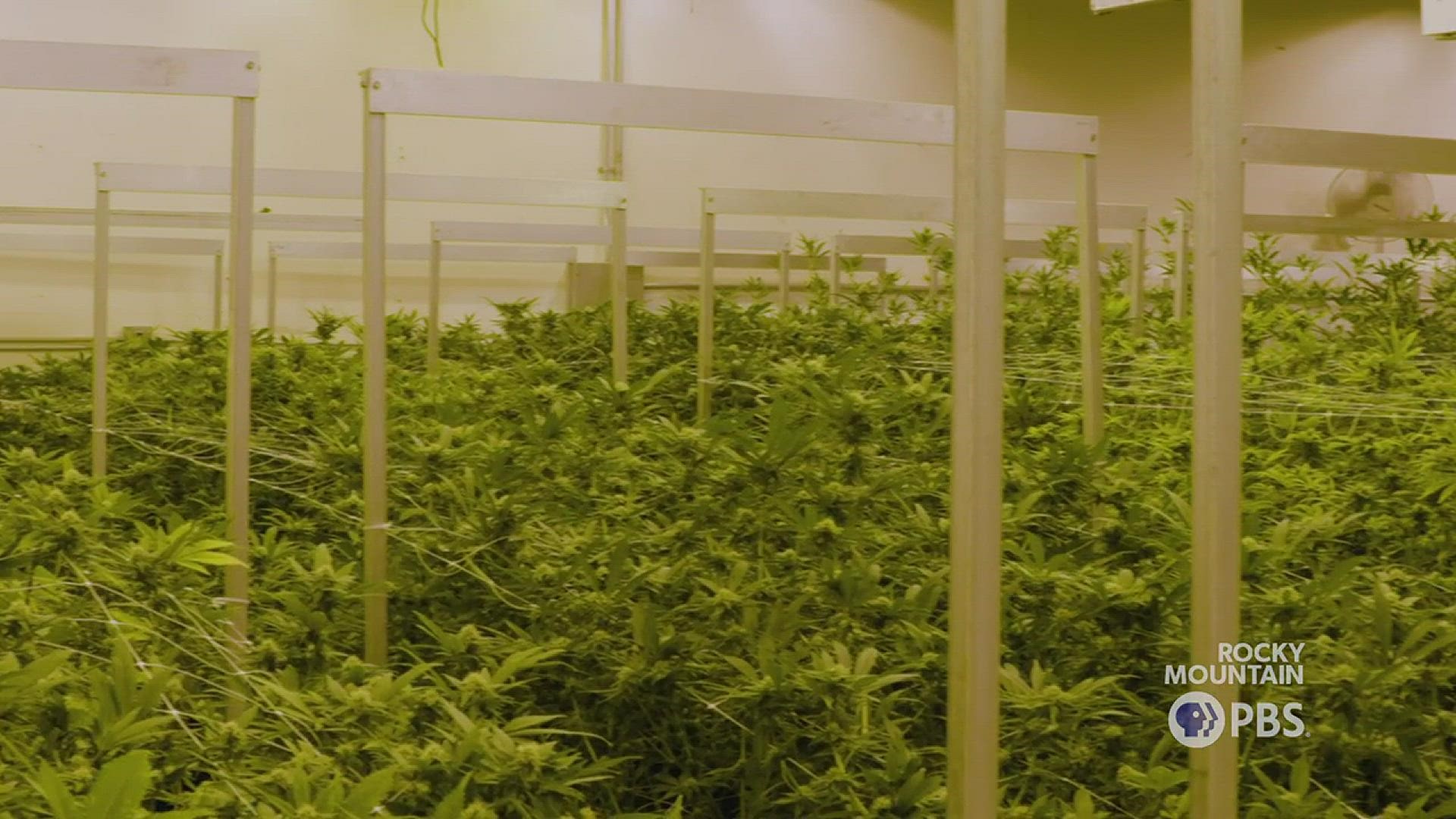DENVER — Growing cannabis indoors can generate a lot of greenhouse gases. In 2020, researchers affiliated with Colorado State University took a closer look at energy use across the U.S. from indoor cannabis cultivation.
“When you look at the total emissions from indoor cannabis cultivation in Colorado, it's pretty much equivalent to the coal mining industry in Colorado,” said Jason Quinn, Ph.D., the director of Colorado State University’s Sustainability Research Laboratory.
The study found that the state’s mining industry is responsible for about 1.8 million metric tons of greenhouse gas emissions (GHGs) every year. The cannabis industry, meanwhile, produces around 2.1 million metric tons of GHGs.
> This story is powered by COLab, the Colorado News Collaborative. 9NEWS joined this historic collaboration with more than 40 other newsrooms across Colorado to better serve the public.
“When that study came out, it was an eye-opener,” said Chris Baca. He is the operations manager at The Clinic, a dispensary in Denver. “It kind of let us know how bad it actually is and how bad it got and how bad it could get in the future if we don't start taking these steps to help minimize that.”
As more states legalize marijuana, Quinn is wondering if environmental impacts should be part of the discussion. As part of their research, Quinn and his colleagues evaluated the indoor growth phases of marijuana cultivation in all states where the plant is farmed.
“It includes everything from lights to HVAC, nutrients, water,” Quinn explained. “Everything that would be consumed as a part of the life cycle of that plant.”
Quinn continued: “We wanted to model indoor cannabis facilities across the entire United States.”
The model took each state’s power mix into account. Some states use more renewable energy, and others rely more heavily on coal-fired power plants. The researchers expected to see a lot of energy consumption with the heavy use of lights in cannabis cultivation.
“Some of the unexpected things were twofold,” Quinn said. “One was the energetics associated with maintaining that comfortable environment. Cannabis plants have a certain window that they are comfortable at, and you're trying to maintain that environment, whether you're in North Dakota or whether you're in Southern California.”
Colorado is fairly dry, with temperatures that swing between hot and cold extremes throughout the seasons. This means a lot of energy is required to keep the environment optimal for cannabis.
The other surprising conclusion from the study was the amount of carbon dioxide (CO2) that is pumped into growing rooms meant to improve the productivity of the plant. “When you have high air exchanges which a lot of these facilities do to combat things like mold,” Quinn said, “you're pushing a lot of CO2 just through the facility.”
The process to create CO2 usually involves the burning of natural gas. Additionally, bottling, transporting, and cycling high amounts of the gas requires a lot of energy.
However, a pilot program found a unique way to address this CO2 problem the Colorado way: through beer. A machine provided by Earthly Labs captures CO2 from the beer fermentation and brewing processes at Denver Beer Co. The CO2 is then sold to The Clinic, a seed-to-sale cannabis dispensary.
Baca compared the CO2 tanks to a propane tank. “It actually smells like beer too, which is one of the cooler parts of it,” he said.


To improve plant productivity, Baca uses a lot of CO2, typically purchased and shipped from an expensive vendor. However, the CO2 tanks from Denver Beer Co. are cheaper and delivered just down the road from the brewery.
“Right now in Colorado, or in the cannabis industry as a whole, we're really on an uphill battle with sustainability,” Baca said. “More ways that cultivators can be more environmentally cautious with their growing practices involve using LED lights; making sure your fans are always […] on at the right, appropriate times to help your environmentals out; making sure you reclaim as much water as you possibly could; looking at composting."
Alternative forms of cultivation like greenhouses and outdoor farms could also reduce the overall greenhouse gas emissions of the industry, especially if combined with renewables. For example, Pot Zero operates outdoors at 8,200 feet in Gypsum, Colorado, relying on one hydro-electric turbine.
“Our preliminary studies have shown that [outdoor cultivation is] at least an 80 percent reduction,” Quinn said. But outdoor growing has its own challenges.
How much CO2 is reduced depends on things like the energy grid, local climate, and farming practices. Plus, there are challenges like security, weather and the fact that outdoor facilities are not allowed everywhere. Cannabis is still a Schedule 1 drug and illegal under Federal law.
“You could federally change the regulations and then be able to transport across state lines so that you can grow in low impact areas and then transport to the higher impact areas,” Quinn said.
“As more of this information is brought to light on how we can be more sustainable, this also accounts for not just growers, but for people who make these rules,” Baca added.
Policymakers, consumers, and the cannabis industry all have a role in how sustainable the industry will be moving forward. By pairing revelatory research with innovative stakeholders, Colorado can push a transformation of the industry.
> Top stories from 9NEWS curated daily just for you! Sign up for the 9NEWSLETTER right now to get can’t-miss stories, Next and Broncos content, weather and more delivered right to your inbox.
SUGGESTED VIDEOS: Latest from 9NEWS
MORE WAYS TO GET 9NEWS
Subscribe to our daily 9NEWSLETTER for top stories from 9NEWS curated daily just for you. Get content and information right now for can’t-miss stories, Next and Broncos content, weather and more delivered right to your inbox.
DOWNLOAD THE 9NEWS APP
iTunes: http://on9news.tv/itunes
Google Play: http://on9news.tv/1lWnC5n
HOW TO ADD THE 9NEWS APP TO YOUR STREAMING DEVICE
ROKU: add the channel from the ROKU store or by searching for KUSA.
For both Apple TV and Fire TV, search for "9NEWS" to find the free app to add to your account. Another option for Fire TV is to have the app delivered directly to your Fire TV through Amazon.

